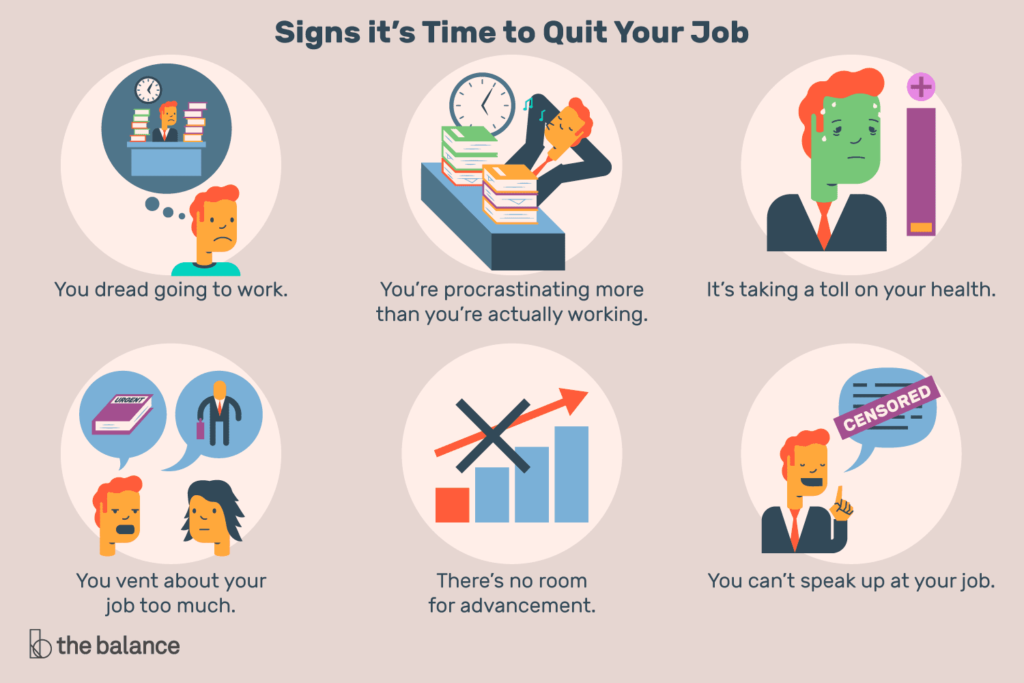“Knowing when it’s time to leave your job is a crucial step in your career. Trust your instincts and have the courage to pursue new opportunities that align with your values and goals.“
– Unknown
As a career coach, I believe knowing when it’s time to resign from a job is a crucial step in your career. Trusting your instincts and having the courage to pursue new opportunities that align with your values and goals is essential. Throughout my years of career guidance and coaching, I’ve encountered several situations where my clients, including myself, realized it was time to move on from our current jobs. In this article, I will share six signs indicating it may be time to consider job resignation and offer insights into how to resign from a job and embark on a new career path.

Signs to resign from a job
- Stagnation of Personal Growth
One of the significant signs that may prompt to resign from a job is the stagnation of personal growth. I recall a time in my career when I felt stuck, with no opportunities for career advancement or development within my organization. Despite my efforts to seek out challenges and take on additional responsibilities, I found myself in a repetitive and unfulfilling routine. Recognizing that my professional growth was being hindered, I decided to explore new job opportunities that would allow me to grow and thrive. If you’ve reached a plateau in your personal development and see limited prospects for advancement within your current job, it might be time to consider job resignation and explore other options that provide room for continuous learning and development.
- Lack of Alignment with Core Values
Another essential aspect that can lead to resign from a job is a lack of alignment with core values. Throughout my career coaching journey, I’ve encountered numerous individuals who discovered the need for their core values to be in sync with the importance their employers place on them. I experienced a similar situation where my organization’s focus on profit overshadowed my values of social responsibility and ethical practices. This misalignment left me feeling disconnected and unfulfilled in my role. When your core values no longer align with your employer’s, it may be time to seek a workplace that shares your values and allows you to contribute to something meaningful through a resignation from your current job.
- Constant Feeling of Burnout
The constant feeling of burnout can also be a compelling reason to consider resignation from a job. I have seen how burnout can adversely affect one’s well-being. When work consistently leaves you physically and emotionally drained, reflecting on the root causes is crucial. While I explored strategies to alleviate burnout with one of my clients, we ultimately concluded that a fresh start through job resignation would be the best solution for long-term happiness and success. If you consistently experience burnout and find no relief or support within your current job, it’s time to consider how to resign from your job to seek a healthier work-life balance and a role that energizes and motivates you.

- Limited Room for Creativity and Innovation
The limitation of room for creativity and innovation can be a significant obstacle to job satisfaction. One of the most fulfilling aspects of work is the ability to bring creativity and innovative ideas to the table. However, when you find yourself in a job that restricts your creative freedom and stifles your innovative spirit, it can leave you feeling uninspired and unfulfilled. I recall the time when I realized my superiors consistently overlooked or dismissed my ideas, hindering my ability to make a meaningful impact. It became clear to me that I needed an environment that fostered creativity and embraced new ideas. If your current job stifles your creativity and limits your ability to innovate, it may be time to consider job resignation and seek a role that values and encourages your unique contributions.
- Hostile Work Environment
A toxic work environment can have a detrimental impact on your mental and emotional well-being. Drawing from my personal experiences and my clients, I have witnessed the damaging effects of workplace toxicity. Constant conflicts, lack of support from colleagues or superiors, and a pervasive hostile atmosphere can drain your energy and hinder your overall job satisfaction. Recognizing the toxicity and taking action to remove yourself from such an environment is essential for your long-term happiness and success. If your work environment is consistently toxic and negatively affects your mental and emotional well-being, it may be time to prioritize self-care and seek a healthier and more supportive workplace.
- Loss of Passion and Motivation
Passion and motivation are the driving forces behind a fulfilling career. However, there may come a time when you find yourself disenchanted and lacking enthusiasm for your work. I experienced a period when my passion waned, and I realized that it was no longer sustainable to continue in a job that no longer ignited my excitement. Through introspection and exploring new possibilities, I rediscovered my passion and charted a new course. If you have lost your passion and motivation for your current job, it may be a sign that it’s time to seek new opportunities that reignite your enthusiasm and align with your long-term goals.
For more related comprehensive articles, check 15 Signs It’s Time To Quit Your Job, 9 Signs You’re Ready To Quit Your Job
What to Do Before Resigning from Your Job
Resign from a job is a significant decision that requires careful consideration and planning. Before taking the leap, it’s crucial to prepare yourself both professionally and personally to ensure a smooth transition and set the stage for your future career endeavors.
- Self-Reflection and Goal Setting: Before making any decisions, take the time for self-reflection and goal setting. Evaluate your career aspirations, values, and long-term objectives. Ask yourself what you want to achieve in your professional life and how your current job aligns with those goals. This introspection will help you gain clarity and ensure that your decision to resign is driven by a well-defined vision for your future.
- Assess Financial Readiness: Resigning from a job can impact your financial stability, so it’s essential to assess your financial readiness before making the move. Evaluate your savings, outstanding debts, and potential sources of income during the transition period. Create a budget to manage your expenses during the job search phase and the time between jobs. Financial preparedness will give you the confidence to navigate any temporary challenges.
- Network and Seek References: Networking is a valuable asset in any job search. Before resigning, reach out to your professional network, including colleagues, mentors, and industry contacts. Inform them about your plans to leave your current job and seek their support and advice. Additionally, request references from supervisors or colleagues who can vouch for your skills and work ethic. Having a strong network and positive references will enhance your credibility and open doors to new opportunities.
- Secure a New Job (If Possible): Ideally, secure a new job before submitting your resignation. Job hunting can take time, so start the process early and actively search for positions that align with your career goals. Prepare an updated resume, tailor your cover letters, and practice for interviews. Landing a new job will provide you with a seamless transition and minimize any gaps in employment.
- Review Employment Contract and Policies: Before resigning, carefully review your employment contract, including notice period requirements and any restrictive clauses. Be aware of company policies related to resignation, such as exit interviews or return of company property. Adhering to these policies will help you maintain a professional and amicable relationship with your current employer.
- Have a Candid Conversation with Your Supervisor: Once you’ve made your decision, schedule a meeting with your supervisor to discuss your intention to resign. Be honest and respectful during the conversation, explaining your reasons for leaving and expressing gratitude for the opportunities provided. This open dialogue will enable a smoother handover process and may even lead to a positive reference in the future.
- Prepare a Resignation Letter: After the conversation with your supervisor, follow up with a formal resignation letter. Keep the letter concise, professional, and appreciative of your time with the company. State your last working day based on the notice period in your contract and offer your assistance during the transition.
- Organize Your Work and Handover Responsibilities: Before your last day, organize your work and hand over responsibilities to your colleagues or the person designated to take over your tasks. Create a comprehensive handover document detailing ongoing projects, deadlines, and key contacts. This proactive approach demonstrates professionalism and ensures a smooth transfer of duties.
Recognizing the signs that it’s time to leave your job can be a transformative moment in your career. As a career coach, I have seen firsthand how embracing change and pursuing new opportunities can lead to personal and professional growth. Reflect on these signs, evaluate your current situation, and trust your instincts. Remember, your career should be a source of fulfillment and satisfaction. Embrace the journey of self-discovery and take the necessary steps to find a job that aligns with your values, fuels your passion, and offers room for growth.
Leaving your job can be challenging, but recognizing the signs and taking action is essential for your long-term happiness and professional fulfillment. I encourage you to reflect on your experiences and assess whether any signs resonate with your current situation. Remember, you deserve a workplace that aligns with your values, ignites your passion, and provides growth opportunities.
If you relate to any of the signs mentioned in this article, it may be time to take the following steps toward finding a more fulfilling career. Start by evaluating your goals, values, and aspirations. Check CareerAndyG website, I can provide guidance and help you navigate this transitional phase. Embrace change, trust your abilities, and pursue a path that brings you joy and fulfillment.

